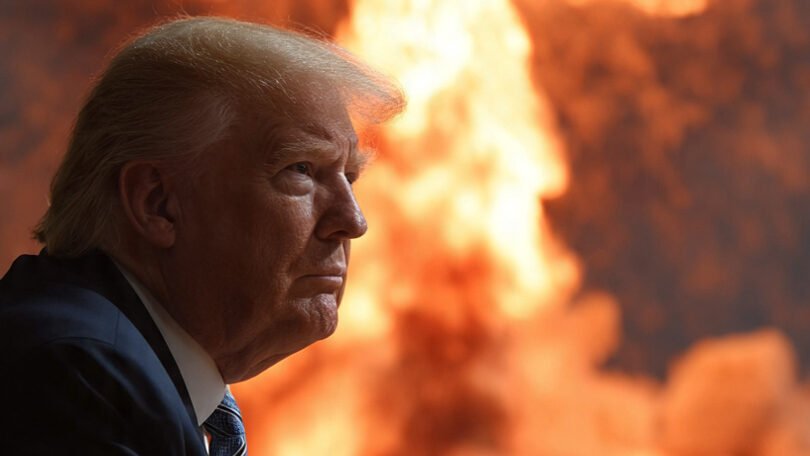Trump Nuclear Testing Decision Ends 30-Year Moratorium
President Donald Trump announced that the Trump nuclear testing program will restart after more than 30 years.
He said the move is essential for national security and global balance.
The United States last conducted such a test in 1992, under President George H. W. Bush.
Trump said the world has changed since then.
According to him, both Russia and China have expanded their nuclear capabilities.
As a result, he ordered the Department of War to prepare for renewed tests.
The announcement came just before his meeting with China’s President Xi Jinping in South Korea.
Trump said on social media that the US must “match and surpass” rival powers.
He called the decision “necessary but responsible.”
Why Trump Nuclear Testing Marks a Major Shift
This decision represents a dramatic policy reversal.
For three decades, the US followed a self-imposed moratorium on nuclear tests.
However, Trump argued that maintaining this freeze weakens America’s deterrence.
The last US nuclear test, called Divider, was held in Nevada in 1992.
Since then, scientists have relied on computer simulations to ensure reliability.
Supporters say real tests are needed to verify weapon performance.
Trump stated that “America cannot remain silent while others advance.”
He insisted that the US must maintain technological superiority.
Critics, however, warn that this step may start a new global arms race.
Russia and China’s Nuclear Advances
Russia recently conducted tests on new delivery systems.
These included a hypersonic missile and the Poseidon underwater drone.
Both are capable of carrying nuclear warheads.
Although those tests did not detonate nuclear weapons, they signaled ambition.
Trump said such moves left the US with “no choice” but to act.
He warned that China’s nuclear stockpile could double within five years.
According to the Arms Control Association, Russia has 5,580 warheads.
The US follows closely with about 5,225.
China currently has around 500 but is rapidly expanding its arsenal.
The Trump nuclear testing order, therefore, aims to keep the US ahead of its rivals.
It also comes as the New START Treaty nears expiration in 2026.
That agreement limits both Washington and Moscow to 1,550 deployed warheads.
Nevada Test Site May Be Reactivated
The Nevada Test Site could once again host underground detonations.
Located about 65 miles north of Las Vegas, it remains under US control.
Experts say the facility can resume operations if authorized.
The last test, conducted there in 1992, ended the nuclear testing era.
It was the 1,054th test in American history.
If reactivated, the site would undergo strict safety evaluations.
Environmentalists warn of potential radiation and long-term contamination.
They argue that underground tests still pose ecological risks.
Local communities have already expressed concern about renewed activity.
Global Reactions to Trump’s Nuclear Testing Plan
International response to the Trump nuclear testing announcement has been cautious.
Russia said it would “closely monitor” US actions.
China urged all sides to “maintain strategic stability.”
European allies, meanwhile, voiced concern about treaty erosion.
They fear renewed testing could damage decades of disarmament progress.
Arms control advocates say this decision could trigger worldwide instability.
The timing is significant, coming just 100 days before New START’s expiration.
Experts believe testing could complicate future negotiations with Moscow.
Without the treaty, global nuclear oversight could weaken further.
Environmental and Ethical Concerns
Environmental groups and scientists are united in opposition.
They emphasize that nuclear tests can contaminate air, soil, and groundwater.
They also highlight health risks to nearby populations.
Critics argue that computer simulations already ensure weapon reliability.
They say restarting physical tests would offer little technical benefit.
However, supporters claim that only live testing guarantees safety and deterrence.
The debate underscores the conflict between defense and diplomacy.
Many believe renewed testing damages America’s image as a peace advocate.
Still, Trump remains firm that security must come first.
Political Timing and Strategic Message
Observers say the Trump nuclear testing decision also carries political weight.
It came during a high-profile diplomatic visit to South Korea.
Analysts believe the move was intended to project power before global rivals.
Some experts describe it as a signal of frustration with arms control limits.
Others call it a campaign strategy to emphasize strength ahead of elections.
Whatever the motive, it reignites debate on nuclear ethics and deterrence.
Resuming testing will not be quick or simple.
It requires infrastructure checks, safety approvals, and billions in funding.
Even then, the first test may take years to conduct.
A New Chapter in the Nuclear Era
The Trump nuclear testing order opens a new chapter in defense policy.
For some, it’s a sign of renewed American leadership.
For others, it’s a dangerous step backward into Cold War-style competition.
Global leaders are calling for restraint and dialogue.
They warn that testing could undo years of arms control progress.
Meanwhile, the world watches closely as preparations begin in silence.
The Nevada desert may again witness flashes unseen since 1992.
This moment marks a turning point for nuclear history and global security.
It reminds the world that deterrence, once again, defines modern power.
